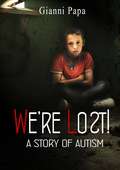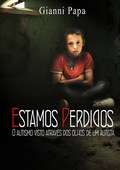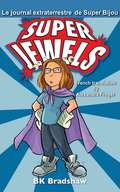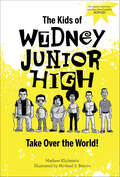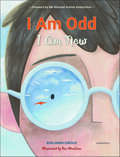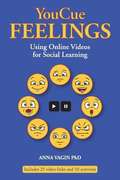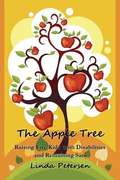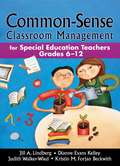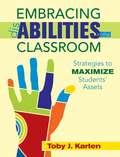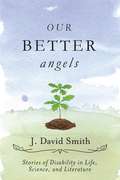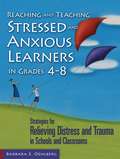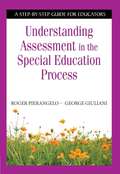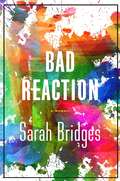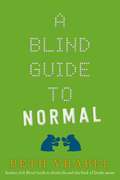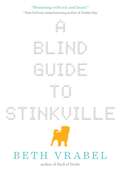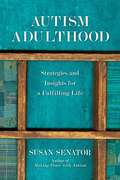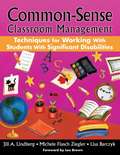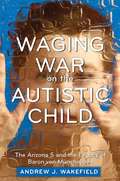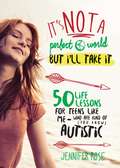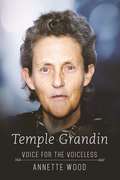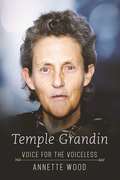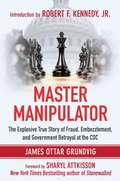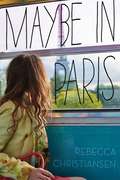- Table View
- List View
We're Lost! A Story of Autism
by Margaret Leah McCall Wood Gianni PapaA unique story of autism, where the autistic child is not only the central character but also the narrator and the witness to a harrowing sequence of events. In WE'RE LOST an autistic child tells the story of his difficult birth, the "very good" and terribly optimistic neuropsychiatrist, the diagnosis by a specialist Catholic clinic, the broken dreams of rehabilitation, the clash with reality, the disappointment. The most authentic novel ever written about the plight of families with autism.
THE MOST ABSURD MYTHS ABOUT DEAFNESS IN WORLD HISTORY
by Karla M. V. Regina AlonsoThe present study gathered mentions and historical data on the vision of society about deaf people dating back the first mankind reports on the topic. The analysis of the facts accessed several sources, comprising a broad variety of texts, from books and scientific websites to entertainment brochures. The study had as objective and goal the compilation of a material with examples of some of the most absurd myths and mentions ever documented about human deafness, showing the power of creative ignorance and how this can hinder even more the life of people inflicted by hearing impairment. The findings pointed out to some considerations; the most obvious is the power of religious ignorance and ill-conceived interpretations and translations, as well as the people's fear when coming across something they do not understand and, for this reason, they end up not knowing how to react. However, it is necessary to make clear that the authors never had the intention of disrespecting, offending or humiliating the authors of the examples used and their religious beliefs. Ultimately, the present study has the purpose of introducing myths and considerations about deaf people and trying to unveil these myths to elucidate and provide explanations for their correction. It also aims at divulging obtained and analyzed technical data to record them permanently, providing a study and data source to encourage other researchers in the area to develop further studies.
Estamos Perdidos. O autismo visto através dos olhos de um autista.
by Marily Santos de Souza Gianni PapaOs pais de uma criança descobrem que o filho é autista. Começa, a partir daquele momento, uma descida no inferno da reabilitação, de médicos despreparados, de psicólogas catastróficas, de pessoas normais horripilantes e pessoas competentes. "Estamos Perdidos" é um livro verdade, que nos narra a estória de uma criança autista, a partir do seu próprio ponto de vista. Gianni Papa amplifica, como uma caixa de som, a voz interior do interprete principal: uma criança autista que descreve a estrada percorrida pela sua família através da experiência do seu complicado desenvolvimento. Os personagens principais não têm um nome, a família é como muitas na Itália, abandonadas no vazio normativo e assistencial, obrigadas a aprender experimentando e às vezes errando, como curar e resolver as dificuldades que derivam de uma situação que lhes coloca fora daquilo que se pode definir "normalidade". O interprete é Eu: uma criança autista, o pai é papai, a mãe é mamãe, e o irmão é o menino pequeno com os cabelos vermelhos. Somente os personagens que cercam a família têm nome e, às vezes, sobrenome. E assim conhecemos a vovó Cinzia, vovó Katya, vovô Francesco, zio Fabio e etc... Nesse livro, Gianni Papa soube interpretar em modo legítimo o pensamento da criança, dando voz à "criança que não sabe falar (mesmo sabendo falar)". Uma criança que observa o mundo ao seu redor e que, como todas as crianças, não pode entender em profundidade o significado de certos comportamentos dos adultos. Uma criança que na dramatização do seu ser, narra com leveza e extrema simplicidade, como só as crianças sabem fazer. Uma criança que vê os adultos complicarem os percursos óbvios e transformar em difíceis os relacionamentos simples. Uma criança que acata as decisões dos grandes com a naturalidade de quem sabe aceitar como sendo justo até aquilo que poderia estar errado e não sabe se perguntar porq.
LOS MITOS MÁS ABSURDOS ACERCA DE LA SORDERA EN LA HISTORIA MUNDIAL
by Karla M. V. Roberto Carlos Pavón CarreónEsta investigación tuvo como objetivo recoger citas y datos históricos tratando la visión de la sociedad acerca de los sordos desde las primeras documentaciones de la humanidad sobre el tema. El análisis de los hechos requirió el acceso a diferentes fuentes de la investigación, que abarcando una gran variedad textual de libros y sitios científicos de diversos sitios. Uno de los objetivos de la investigación tenía era un trabajo con ejemplos de los mitos y las citas más absurdos ya documentados sobre la sordera humana, lo que demuestra la ignorancia o el poder creativo y cómo eso puede dificultar más a la vida de quienes padecen deficiencia auditiva. Los hallazgos señalan algunas consideraciones, y, lo más obvio de ellas, el poder de la ignorancia religiosa e interpretaciones así como de traducciones mal concebidas, así como el miedo de la gente a enfrentar algo que no entiende y, por lo tanto, terminan por no saber cómo actuar. Aún así, es preciso aclarar que no se tuvo intención alguna de ofender, humillar o faltar el respeto a los autores de los ejemplos y sus creencias religiosas. De todos modos, esta obra sólo tiene la intención de presentar mitos y sus consideraciones acerca de los sordos y tratar de acabar con tales historias a fin de aclarar y dar explicaciones en las correcciones, mostrando los datos técnicos obtenidos y analizados, para registrarlos en carácter permanente; pudiendo proporcionar una fuente de estudio capaz de estimular futuros trabajos de otro investigadores en el área.
Le journal extraterrestre de Super Bijou
by Alexandra Froger Bk BradshawPourquoi tout semble si facile pour les autres ? Bijou nous raconte ses aventures de la Maternelle-Prison jusqu'au Collège, tout en cherchant des indices sur ce qui la distingue des autres. Pourrait-elle être une extraterrestre, un super-héro ou quelque chose de complètement différent ? Rejoignez Bijou dans son exploration de ce monde confus - et souvent hilarant - des attentes sociales. Le voyage de Bijou à la découverte de soi, l'emmène à des endroits inattendus et le plus surprenant est de se retrouver un peu nous même en cours de route.
The Kids of Widney Junior High Take Over the World!
by Mathew KlicksteinThe Kids of Widney Junior High Take Over the World!is a fun-filled story for middle grade readers ages 8 to 12 inspired by the real-life Kids of Widney High, a rock band made of members with developmental disabilities, and offers readers fresh thoughts on how to better interact with classmates and friends living with disabilities.
I Am Odd, I Am New
by Benjamin GirouxFeaturing a foreword by the National Autism Association, this extraordinary picture book shows readers the world through the eyes of a boy with autismChildren will be reassured that everyone is different, and that different is a quality we should all embraceWritten by a 10-year-old boy on the autism spectrum, this Schiffer Kids by Kids title is part of our program designed to create books by kids for kids
YouCue Feelings: Using Online Videos for Social Learning
by Anna VaginFeelings are a crucial element of social relationships, yet students with social learning challenges (some with diagnoses such as Autism Spectrum, Social Communication Disorder or ADHD) frequently have limited understanding of emotions. Our goal for students with such challenges is for them to acquire social relationship skills that will improve their capacity for effective, fulfilling relationships with family members, people at their school or work, and members of their broader community. This is a large and complicated task. YouCue Feelings simplifies such learning using a relatively new form of storytelling - online videos - to accelerate learning about feelings and relationships. YouCue Feelings includes summaries and titles of 25 wonderful online, easily accessed videos. Each has been selected for its portrayal of rich social relationships and crucial social learning concepts. YouCue Activities, done in conjunction with video viewing, make up the core of the YouCue Feelings program. These activities range from simple drawing projects or discussions about the characters in a YouTube video, to more sophisticated activities such as building connections between the social learning concepts in videos and what happens in a student's everyday life.
The Apple Tree: Raising Five Kids with Disabilities and Remaining Sane
by Linda PetersenHer story begins not with her children but with her own childhood spent traveling the country in the backseat of her parents' car (her perpetually restless dad had post-traumatic stress disorder from WWII), often with very little money and few provisions. Where someone else might have seen deprivation and isolation, Petersen viewed her unusual childhood with a sense of wonder and gratitude. After marrying young and giving birth to a son who was legally blind (and who went on to earn a PhD on full scholarship), Petersen and her husband adopted four more special needs children and fostered many others. Each child has their own special story about overcoming tremendous physical and emotional difficulties in order to be able to succeed and enjoy life. Her honesty, wit, and terrific storytelling make this a book you want to read rather than one you feel you should read.
Common-Sense Classroom Management: For Special Education Teachers, Grades 6-12 (1-off Ser.)
by Jill A. Lindberg Kristin M. Forjan Beckwith Judith Walker-Wied Dianne Evans KelleyIf you're a teacher new to special education, this book is for you! This newest Common-Sense Classroom Management guide addresses the most critical challenges that arise when teaching adolescent learners with special needs. In this flexible and easy-to-implement resource, educators will find 80 concise and teacher-tested strategies. Each strategy works in five steps or fewer, helping special educators feel competent and confident about working with co-teachers, teacher aides, support staff, administrators, and families. The authors, all special education experts, provide practical assistance with: * Specially designed instruction and student organization to make teaching more effective * Legal responsibilities aligned with IDEIA and NCLB requirements * Positive behavioral supports, including incentive programs and meaningful consequences Ideal for teachers new to special education, teacher trainers, and teacher mentors, this resource provides a clear-sighted focus to help you shape the structure of each teaching day and ensure success for all your learners with special needs!
Embracing Disabilities in the Classroom: Strategies to Maximize Students? Assets
by Toby KartenHow we treat others often influences how individuals feel about themselves. This book illustrates how educators can effectively promote sensitive, inclusive classroom practices that maximize success for students with disabilities. Embracing Disabilities in the Classroom provides content-rich interdisciplinary lessons accompanied by behavioral, academic, and social interventions that capitalize on student strengths. Inclusion expert Toby J. Karten demonstrates the impact of literature, self-advocacy, role playing, and strategic interventions on students' growth and achievement. The numerous lessons, tables, rubrics, instructional guidelines, and charts help readers: * Determine effective strategies for differentiating instruction for specific disabilities * Modify lessons and curriculum appropriately in the content areas * Encourage students to become active participants in learning * Increase disability awareness and foster inclusive mind-sets in students, colleagues, and families This practical resource provides special education and general education teachers, principals, and teacher leaders with both effective instructional strategies for curriculum delivery and responsive approaches to promoting positive attitudes toward disabilities. Given appropriate support and an accepting environment, all students are able to achieve, thrive, and succeed in school and in life!
Our Better Angels: Stories of Disability in Life, Science, and Literature
by J David SmithDo children and adults with disabilities enrich our lives? Far more than most people imagine.Our Better Angels is a testament to the value of individuals with disabilities and the value that society could derive from being more welcoming to and inclusive of them. The reward is the powerful humanizing influence that they can have on others-even some of the most hardened people among us.Colorful, real-life examples illustrate how a disability can be a valuable human attribute, a powerful source of compassion from which everyone can benefit.What are the challenges that face us as we strive for a more inclusive society? What are the values that should guide us in our efforts? Smith approaches these questions by examining his own experience and other unique perspectives: Meet the children and adults with disabilities who have touched his own life Consider what science-and pseudoscience-has said about disability View disability through the lens of history and literatureThe result is a compelling case for understanding and celebrating human diversity. Smith asks us to summon the "better angels" of our character and affirm our commitment to a society based on equality and democracy.
Reaching and Teaching Stressed and Anxious Learner: Strategies for Relieving Distress and Trauma in Schools and Classrooms
by Barbara OehlbergThis important new resource helps educators understand how trauma and stress interfere with cognitive skills, and how classroom and school activities can be used to restore feelings of safety, empowerment, and well-being.
Understanding Assessment in the Special Education Process: A Step-by-Step Guide for Educators
by Roger Pierangelo George GiulianiAn ideal step-by-step reference for instructors who have not had specific training in assessing students with special needs, Understanding Assessment in the Special Education Process helps educators make the most effective use of available assessment options.
A Bad Reaction: A Memoir
by Sarah BridgesA mother’s story of raising an autistic son, navigating the vaccine court, and confronting the widespread denial of a link between vaccines and autism.At four months old, Porter Bridges went in for his well-baby checkup and received an array of vaccines. That night he spiked a 105-degree fever and had a two-hour grand mal seizure. He was rushed to the hospital where doctors struggled to stabilize him while his family paced the halls waiting to hear if he was conscious. Though no one could know it at the time, Porter’s hospitalization marked the start of a terrifying and tragic decline in his health and the health of his family. And while the effects of Porter’s reaction would take years to fully develop, the cause was never in doubt-Porter’s hospital record reads, "Brain injury from pertussis vaccine.”Cognitive dissonance is the psychology term for that queasy feeling we get when things just don’t line up. Here are the facts: Porter is a healthy infant one moment and has brain damage the next. The CDC says vaccines are always safe, but the National Vaccine Injury Compensation Program awards Porter’s family millions of dollars to pay for his pertussis injury. The CDC sends a press release saying vaccines never cause autism. That afternoon, government funds pay for Porter’s autism therapy. He goes three times a week.A Bad Reaction is a personal journey-sometimes painful, sometimes funny. It confronts the dissonance between what the government tells us about the vaccine-autism link and its secret payments compensating the vaccine-injured. It tackles broader issues such as individual versus government responsibility, the conflicts of interest in vaccination-safety research, and the balance of individual and collective good. Vaccines hold the special distinction of being the only mandated drugs all children receive and have saved innumerable lives. They also have safety risks. This book is about one of those "negative outcomes.” His name is Porter.Skyhorse Publishing, along with our Arcade, Good Books, Sports Publishing, and Yucca imprints, is proud to publish a broad range of biographies, autobiographies, and memoirs. Our list includes biographies on well-known historical figures like Benjamin Franklin, Nelson Mandela, and Alexander Graham Bell, as well as villains from history, such as Heinrich Himmler, John Wayne Gacy, and O. J. Simpson. We have also published survivor stories of World War II, memoirs about overcoming adversity, first-hand tales of adventure, and much more. While not every title we publish becomes a New York Times bestseller or a national bestseller, we are committed to books on subjects that are sometimes overlooked and to authors whose work might not otherwise find a home.
A Blind Guide to Normal
by Beth Vrabel<P>Ryder Randolf can find humor in any situation-even in the fact that he is partially blind and has an artificial eye. He's spent the past year making jokes at Addison School for the Blind, earning the respect and friendship of his classmates. Now, he's headed off to a "normal" school for eighth grade. Ryder has gone from being a big fish in a small pond to a strange guppy in a vast ocean, and he struggles to maintain his dignity while everyone at school pities him <P>.Then Ryder makes an enemy in Dean Windham, the most popular guy at school. A situation between the two that could easily be overlooked is made worse by a teacher with good intentions and the fact that Ryder just can't seem to stay away from Dean's girlfriend, Jocelyn. To try to combat the bullying, Ryder listens to his friend Alice's recommendation that he take up karate. While he's pleasantly surprised to find that Jocelyn is an instructor, he's disappointed to learn that Dean is also one. <P>Ryder seeks to dominate the competition in his karate tournament. But he and Dean continue to clash, resulting in Ryder's good eye being injured. Suddenly things aren't so funny anymore. <P>In this exciting sequel to A Blind Guide to Stinkville, Beth Vrabel weaves humor, sadness, and love into a story with characters that have you hooked from page one.
A Blind Guide to Stinkville
by Beth VrabelBefore Stinkville, Alice didn’t think albinism-or the blindness that goes with it-was a big deal. Sure, she uses a magnifier to read books. And a cane keeps her from bruising her hips on tables. Putting on sunscreen and always wearing a hat are just part of life. But life has always been like this for Alice. Until Stinkville.For the first time in her life, Alice feels different-like she’s at a disadvantage. Back in her old neighborhood in Seattle, everyone knew Alice, and Alice knew her way around. In Stinkville, Alice finds herself floundering-she can’t even get to the library on her own. But when her parents start looking into schools for the blind, Alice takes a stand. She’s going to show them-and herself-that blindness is just a part of who she is, not all that she can be. To prove it, Alice enters the Stinkville Success Stories essay contest. No one, not even her new friend Kerica, believes she can scout out her new town’s stories and write the essay by herself. The funny thing is, as Alice confronts her own blindness, everyone else seems to see her for the first time.This is a stirring small-town story that explores many different issues-albinism, blindness, depression, dyslexia, growing old, and more-with a light touch and lots of heart. Beth Vrabel’s characters are complicated and messy, but they come together in a story about the strength of community and friendship. This paperback edition includes a Q&A with the author and a sneak peak at the upcoming The Blind Guide to Normal.Sky Pony Press, with our Good Books, Racehorse and Arcade imprints, is proud to publish a broad range of books for young readers-picture books for small children, chapter books, books for middle grade readers, and novels for young adults. Our list includes bestsellers for children who love to play Minecraft; stories told with LEGO bricks; books that teach lessons about tolerance, patience, and the environment, and much more. While not every title we publish becomes a New York Times bestseller or a national bestseller, we are committed to books on subjects that are sometimes overlooked and to authors whose work might not otherwise find a home.
Autism Adulthood: Strategies and Insights for a Fulfilling Life
by John Elder Robison Susan SenatorOne of the biggest fears of parents with children with autism is looming adulthood and all that it entails. In her new book Susan Senator takes the mystery out of adult life on the autism spectrum and conveys the positive message that even though autism adulthood is complicated and challenging, there are many ways to make it manageable and enjoyable. From her own son with autism, now twenty-five, she has learned ?never say never.”Autism Adulthood features thirty interviews with autistic adults, their parents, caregivers, researchers, and professionals. Each vignette reveals firsthand a family’s challenge, their circumstances, their thought processes, and their unique solutions and plans of action. Sharing the wisdom that emerges from parents’ and self-advocates’ experiences, Senator adds her own observations and conclusions based on her long-term experience with autism. Told in Senator’s trademark warm, honest, and approachable style, Autism Adulthood paints a vivid and thought-provoking picture of many people grappling with grown-up, real-life autism. Senator’s is the only book of its kind, as real families share their stories and their creative solutions.
Common-Sense Classroom Management: Techniques for Working with Students with Significant Disabilities
by Jill A. Lindberg Lisa Barczyk Michele Flasch ZieglerToday's diverse classrooms challenge even the most experienced teachers. Using an easy-to-read format, this resource offers tools and techniques that teachers can use to reach all learners, particularly those with more significant disabilities, and give them the support they need to succeed.
Waging War on the Autistic Child: The Arizona 5 and the Legacy of Baron von Munchausen
by Andrew J. WakefieldAs the number of children diagnosed with autism spectrum disorders grows each year, new discoveries and controversies arise. Andrew Wakefield explores many of these in his thorough investigation of the recent trial case of the "Arizona 5,” which destroyed an Arizona family. Two parents, with five children on the spectrum, were accused of Munchausen syndrome by proxy-a rare form of child abuse-and were ganged up on by physicians, child protective services, and the courts, who alleged that the parents fabricated medical symptoms in all five children. However, Wakefield now presents ample evidence that was disregarded and that would have proven the parents’ innocence.Families affected by autism suffer great hardship and prejudice, particularly as they navigate the uncertain waters of diagnosis, treatment, and education. The shocking story of the Arizona 5 family delves into the tremendous challenges some parents have to face, especially if their views on how to treat the syndrome don’t align with the medical world’s standards. Wakefield also includes numerous studies and research trials that support the controversial yet significant roles that vaccines and diet play in autism, factors many medical professionals wrongfully dismiss.
It's Not a Perfect World, but I'll Take It: 50 Life Lessons for Teens Like Me Who Are Kind of (You Know) Autistic
by Jennifer RoseJennifer Rose is autistic. She’s also a college student who loves reading, writes fan fiction, and wants to be on TV someday. She sees the world a little differently than most people around her. She’s had trouble coping with school and she’s struggled with bullies, mean girls, and her own feelings of bitterness and inferiority. Through it all, with the help of her parents, she’s learned a few lessons: #5: There are many ways to make a difference. #20: You won’t be perfect at everything, not even the things you do best. #22: Down times will be bouncing up soon . . . #23: . . . but meanwhile, try to enjoy what you have. #44: Talk about your feelings, even when it’s hard. #45: Learn to take jokes, even your dad’s. It's Not a Perfect World but I’ll Take It is an uplifting ode to being different. Told with irresistible honesty and humor, Rose’s fifty bite-sized stories will have teens and adults nodding in recognition and discovering new things about themselves.
Temple Grandin: Voice for the Voiceless
by Annette WoodSince Temple Grandin's life story was told in the 15 x Emmy-nominated film Temple Grandin, and since her heartwarming speech at the award ceremony, she has become one of the world's most well-known members of its community. In this fascinating biography, Annette Wood delves deep into Grandin's life from childhood to adulthood. Wood tells of the trials and tribulations of the icon: What difficulties Grandin struggled with and how she's become a hero for the autistic community. She also tells what Temple has done since the movie came out, where she is today, what kind of difference she's made, and what her future holds. For the 22 million people worldwide afflicted by autism and the countless friends and family members who support them, this brilliant portrait presents an up-close look at the disorder and renewed hope for what the future could bring for those on all levels of the spectrum.
Temple Grandin: Voice for the Voiceless
by Annette WoodSince Temple Grandin's life story was told in the 15 x Emmy-nominated film Temple Grandin, and since her heartwarming speech at the award ceremony, she has become one of the world's most well-known members of its community. In this fascinating biography, Annette Wood delves deep into Grandin's life from childhood to adulthood. Wood tells of the trials and tribulations of the icon: What difficulties Grandin struggled with and how she's become a hero for the autistic community. She also tells what Temple has done since the movie came out, where she is today, what kind of difference she's made, and what her future holds. For the 22 million people worldwide afflicted by autism and the countless friends and family members who support them, this brilliant portrait presents an up-close look at the disorder and renewed hope for what the future could bring for those on all levels of the spectrum.
Master Manipulator: The Explosive True Story of Fraud, Embezzlement, and Government Betrayal at the CDC
by Robert F. Kennedy Jr. Sharyl Attkisson James Ottar GrundvigThe explosive true story of fraud, embezzlement, and government betrayal. In 2000, the US Centers for Disease Control (CDC) carried out a secret mission to bury, skew, and manipulate data in six vaccine safety studies, in a coordinated effort to control the message that "vaccines do not cause autism.” They did so via secret meetings and backtesting health-care data. The CDC invested tens of millions of dollars in a foreign health-care data analytics startup run by Danish scientist Poul Thorsen, a move to ensure that no link ever surfaced. But fate had other ideas. The agency soon learned it couldn’t control Thorsen. In 2011, the US Justice Department indicted him for the theft of more than $1 million of CDC grant money.Master Manipulator exposes the CDC’s hidden agenda for the cover-up. Influenced by Big Pharma money, future high-paying jobs, and political lobbyists, CDC executives charted a course different than what the findings of earlier vaccine safety studies revealed. The CDC needed an outsider to "flatten” the results of the data, while building an exit strategy: a fall guy in case the secret plan was exposed. Thorsen fit the bill nicely, conducting studies overseas. But the CDC’s plan backfired, as Thorsen took the money to the bank and the power went to his head. It would take years for his fraud scheme funneling CDC grant money to a Danish university and then back to a CDC bank account he controlled to play out.Master Manipulator is a true story of fraud and betrayal, and an insider’s view of what takes place behind the closed doors of agencies and drug companies, and with the people tasked to protect the health of American children. It’s a cautionary tale of the dangers of blind trust in the government and the health-care industry.
Maybe in Paris
by Rebecca ChristiansenKeira Braidwood lands in Paris with her autistic brother, Levi, and high hopes. Levi has just survived a suicide attempt and months in the psych ward-he’s ready for a dose of the wider world. Unlike their helicopter mom and the doctors who hover over Levi, Keira doesn’t think Levi’s certifiable. He’s just . . . quirky. Always has been.Those quirks quickly begin to spoil the trip. Keira wants to traipse all over Europe; Levi barely wants to leave their grubby hotel room. She wants to dine on the world’s cuisine; he only wants fast food. Levi is one giant temper tantrum, and Keira’s ready to pull out her own hair.She finally finds the adventure she craves in Gable, a hot Scottish bass player, but while Keira flirts in the Paris Catacombs, Levi’s mental health breaks. He disappears from their hotel room and Keira realizes, too late, that her brother is sicker than she was willing to believe. To bring him home safe, Keira must tear down the wall that Levi’s sickness and her own guilt have built between them.
